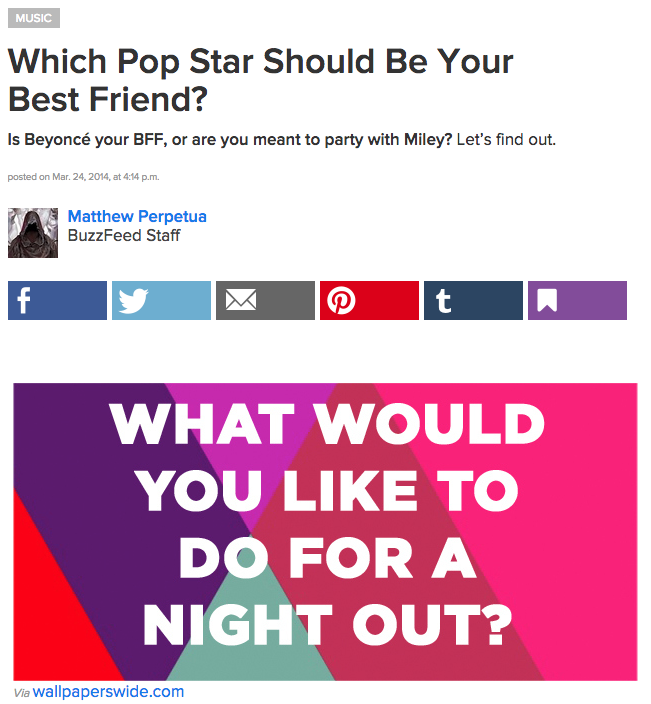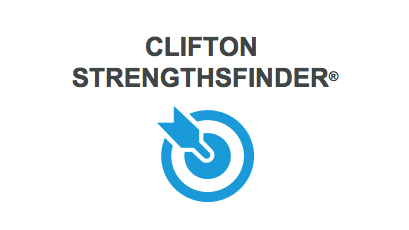
Do you have a question for Dr. Brady? Just click here to access the confidential online submission form.
Dear Dr. Brady,
I am “An Innovator,” “Yellow,” “A Dog,” “48 percent similar to my partner,” and about a dozen other things based on the results from my online personality tests. I am sort of a sucker for all things “quizzicle” but is there really anything to these things, or is it just a one-size-dupes-all time waster?
Signed,
Just my type,
Dear Just My Type,
Which of the following best describes your ideal night out?
- Out, who said I wanted to go out?
- Camp fire and ghost stories.
- Film festival and a dessert tasting.
- Why does only one of these have to be right?
 The interest in comparing and classifying ourselves and others has been driving human thinking for centuries. From “elements” to “humors,” from body shapes to star signs, we have a passion for classifying ourselves and others. Only in the last 80 years have we approached classification from a scientific point, going beyond the pseudoscience of phrenology and moving towards statistically refined measurement approaches.
The interest in comparing and classifying ourselves and others has been driving human thinking for centuries. From “elements” to “humors,” from body shapes to star signs, we have a passion for classifying ourselves and others. Only in the last 80 years have we approached classification from a scientific point, going beyond the pseudoscience of phrenology and moving towards statistically refined measurement approaches.
So, does that mean your online test is a reliable and valid way of measuring your personality? Not exactly.
While there are a variety of theories about personality, most tests are assessing the degree to which one’s answers match a pattern that represents one type of person as compared to other types of people. The online personality tests usually provide a few prompts, determine these prompts align to one idea type or another, and then present you with your “most similar” answer group. Seems pretty straightforward, right? Why wouldn’t this be accurate?
Well it has to do with how the questions were created and what the underlying idea is about their meaning. You like strawberry ice cream more than chocolate? Ok. How does that help me know whether you will be calm under pressure or whether you are an optimist or a pessimist? As fun as the questions are, and as reassuring as seeing ourselves neatly summarized can be, there isn’t a whole lot of substance behind the scenes.
 I say this because I do know that personality assessment can be a very useful tool. I use it in advising personnel selection, in working with clinical patients to understand strength and challenge areas, and in helping understand why one parenting approach works great with one child but fails miserably with another. The best way to think about personality is to think of layers. There is some “truth” to the idea that we are all certain “types” of people. In personality research we call this “trait” theory. And many of us have a tendency to like certain kinds of events, prefer certain types of interactions, and respond in similar ways over time.
I say this because I do know that personality assessment can be a very useful tool. I use it in advising personnel selection, in working with clinical patients to understand strength and challenge areas, and in helping understand why one parenting approach works great with one child but fails miserably with another. The best way to think about personality is to think of layers. There is some “truth” to the idea that we are all certain “types” of people. In personality research we call this “trait” theory. And many of us have a tendency to like certain kinds of events, prefer certain types of interactions, and respond in similar ways over time.
Understanding why this is and how it came to be requires thinking about the layers. We are made up of our biological reactivity, which is determined in part from genetics, in part from the prenatal environment we came from, and in part from the collection of our early life experiences. This makes up the temperament layer, which is how biologically hardwired we are to react to stressors and rebound from stress. Our general traits are our second layer; think of these as the adjectives most people would use to describe us. Add to these two layers our experience which includes both what happens to us, what we think these things mean for us, and how we see these events fitting into our broader life story. You can mix in the specific historical time you live in, family size and dynamics faced while growing up, and culture and gender to get an even richer description and understanding of one’s personality. All these layers are parts of the personality puzzle. And no one layer holds the whole answer of who someone “is.”
In general, at the core of any personality test, online or in my office, is a set of questions. What makes this person “tick”? How do they generally see others and how do others generally see them? What do they generally think about themselves? When they are facing great difficulty, how do they typically react? What can they do function in their best way possible?
 Are you wasting your time with these tests? Well, yes, if what you are seeking is a reliable and valid assessment of your personality. If you are seeking this I would suggest you work with a psychologist, the only mental health professionals actually trained and qualified to use personality assessments like the California Personality Inventory, the Minnesota Multiphasic Personality Inventory, or the NEO-PI inventory. You might also work with a vocational counselor if you are interested in understanding what careers your personality and interests might map well to as they can administer the Strong Interest Inventory (which trust me is way more helpful than the MBTI, which is really NOT useful or scientific despite decades of over-use!). Along these lines there are some books with online tests such as “Strengthsfinder” that are pretty useful in describing talent areas, but pretty light in determining overall personality.
Are you wasting your time with these tests? Well, yes, if what you are seeking is a reliable and valid assessment of your personality. If you are seeking this I would suggest you work with a psychologist, the only mental health professionals actually trained and qualified to use personality assessments like the California Personality Inventory, the Minnesota Multiphasic Personality Inventory, or the NEO-PI inventory. You might also work with a vocational counselor if you are interested in understanding what careers your personality and interests might map well to as they can administer the Strong Interest Inventory (which trust me is way more helpful than the MBTI, which is really NOT useful or scientific despite decades of over-use!). Along these lines there are some books with online tests such as “Strengthsfinder” that are pretty useful in describing talent areas, but pretty light in determining overall personality.
Overall whatever test you take is as good as the information you provide. Some of us are pretty clear-eyed when it comes to describing who we are and what we like. But most of us have some blind spots that others around us see more clearly. If you want to know what you are like as a person ask a lover, a former boss, and someone who you are in charge of like your child or supervisor. They will know the answer before you can get the question out!
Will the world end because of one more online quiz? Not a chance. Just know that your voluntary testing is someone else’s ad revenue generating click-bait. If you are comfortable with that then test away!
Of course I would prefer you ASKED questions online rather than answered them!
Alright, it’s your turn. I hope you’ll join me in seeking clarity for the shifts you are navigating.
Readers of Manchester Ink Link seek relevant, local, and pragmatic reporting. Carol Robidoux provides layered reports that allow all of us to feel not only part of the story, but partners in resolution. My hope is that this column will serve as a compass for readers seeking clarity in the chaos of their businesses, personal lives, or relationships. From time to time we will have guest columnists offer their insight on a challenge. This information is simply opinion, but I hope you will share your stories so that others can gain clarity for themselves. Questions are powerful. We hope you will share yours here.
For more on this topic:
Frequently asked questions about personality testing

Loretta L.C. Brady owns BDS Insight a culture, crisis, and conflict management firm in Manchester. She is an Associate Professor of Psychology at Saint Anselm College. She, her husband Brian Brady, and their 5 children live and work in Manchester.
 sional. This column, its author, the newspaper and publisher are not responsible for the outcome or results of following any advice in any given situation. You, and only you, are completely responsible for your actions. Dr. Loretta L.C. Brady, clinical and organizational psychologist, offers her and guest columnist opinions on a variety of current event and reader submitted subjects. She and they are expressing personal and professional opinions and views. Manchester Ink Link and Dr. Loretta L.C. Brady are not responsible for the outcome or results of following the advice of this column in any given situation.
sional. This column, its author, the newspaper and publisher are not responsible for the outcome or results of following any advice in any given situation. You, and only you, are completely responsible for your actions. Dr. Loretta L.C. Brady, clinical and organizational psychologist, offers her and guest columnist opinions on a variety of current event and reader submitted subjects. She and they are expressing personal and professional opinions and views. Manchester Ink Link and Dr. Loretta L.C. Brady are not responsible for the outcome or results of following the advice of this column in any given situation. You’re one click away! Sign up for our free eNewsletter and never miss another thing.
You’re one click away! Sign up for our free eNewsletter and never miss another thing.







